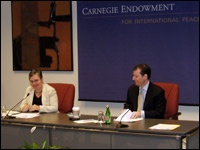Registration
You will receive an email confirming your registration.
IMGXYZ772IMGZYXOn September 17, the Carnegie Endowment hosted a discussion on U.S.-Turkmenistan relations with Deputy Assistant Secretary of State for South and Central Asian Affairs Evan A. Feigenbaum. Carnegie Senior Associate Martha Brill Olcott chaired the discussion.
Several themes were raised in the question-and-answer session. These included Turkmenistan's relations with other Central Asian countries, its possible participation in the Shanghai Cooperation Organization (SCO), its economic development, and what the United States has learned from its past dealings with Turkmenistan.
Dr. Feigenbaum started by noting the importance of encouraging ties between Turkmenistan and other Central Asian countries, not only in the energy arena but across a broad political and economic spectrum.
Turkmenistan, he said, has taken steps to improve the investment climate with the clear recognition that certain changes have to be made. Such steps do not imply that the United States is seeking to disturb existing Russian contacts. Broadly speaking, the challenges of a resource-dependent economy are beginning to dawn on Central Asian countries. Kazakhstan has made an effort to diversify both within the hydrocarbon sector, moving away from large investments from large companies, and outside of the hydrocarbon sector as well. American companies, such as GE and FedEx, are making an appearance because policy choices have created a increasingly diversified economy in Central Asian countries. The Turkmen leadership has been in discussions with U.S. officials about attracting private sector attention in a range of sectors in its nation's economy.
Dr. Feigenbaum elaborated that the relationship should be seen as a process in which success builds on success. It cannot be measured in days or weeks; it is a long-term venture. The United States avoids telling the Turkmen leadership what its national interests are. Rather, he said, the U.S. government wishes to give the Turkmen a vision of what the strategic opportunities are and let them decide. The approach is based on sovereignty and independence. The Turkmen government itself has changed in terms of what it wishes from its international environment and it is choosing to come out of its self-imposed isolation, a move that the United States welcomes.
The United States sees possibilities to increase aid and assistant packages to Turkmenistan, but it fundamentally comes down to the involvement of the private sector. Although it is clear that the Turkmen leadership has realized that some things need to change, the United States is realistic in its approach. Education is a bedrock issue in the transition process; there is a great deal of talent that the Turkmen government can tap with the support of U.S. programs. The United States has offered specific ideas to the Turkmen government in this area.
Dr. Feigenbaum concluded by emphasizing his pleased surprise at the positive developments over the past nine months and his excitement about the possibilities for further engagement and development that now exist.
Evan A. Feigenbaum is Deputy Assistant Secretary of State for South and Central Asian Affairs, with principal responsibility for Central Asia. From 2001 to 2006, he was a member of the Secretary of State's Policy Planning Staff with responsibility for Asian countries, regional strategy, and multilateral organizations (ASEAN, APEC, ARF). He was involved in an array of bilateral issues in U.S. relations with Asian countries, including the U.S.-China Senior Dialogue, and assisted Secretary of State Colin Powell in speechwriting and strategic planning for Asia. Prior to government service, Dr. Feigenbaum was a Lecturer on Government and Executive Director of the Asia-Pacific Security Initiative and Program Chair of the Chinese Security Studies Program in the John F. Kennedy School of Government at Harvard University from 1997 to 2001. He has taught at the U.S. Naval Postgraduate School and served as a consultant to the RAND Corporation. He has published two books, China's Techno-Warriors: National Security and Strategic Competition from the Nuclear to the Information Age and Change in Taiwan and Potential Adversity in the Strait, and many articles in journals and newspapers. He has been awarded many prizes and fellowships, including Olin and Belfer fellowships at Harvard and a fellowship at the Center for International Security and Cooperation at Stanford. He received his Ph.D. in political science from Stanford University and his A.B. in history from the University of Michigan.
